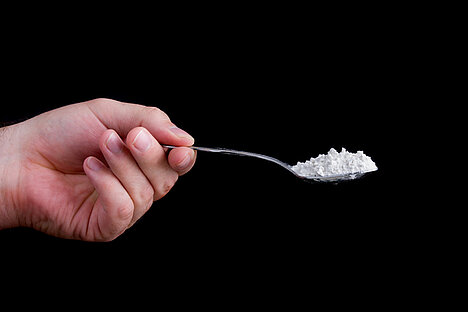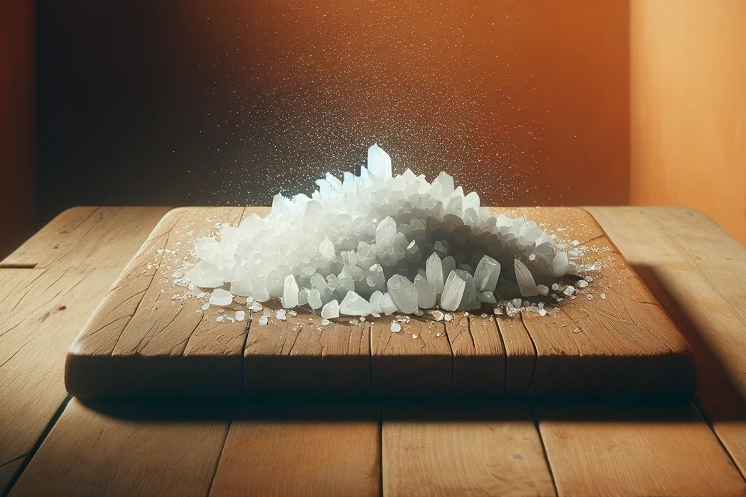Monocalcium phosphate

Monocalcium phosphate is a natural source of calcium and phosphorus that is often used as a supplement for dogs and cats. Calcium and phosphorus are important minerals for bone structure, teeth, muscles and the nervous system. In this article you will find out what monocalcium phosphate is, how it is produced, what its advantages and disadvantages are and how you can dose it for your dog.
What is monocalcium phosphate?
Monocalcium phosphate is a chemical compound of calcium, phosphorus and oxygen, also known as calcium dihydrogen phosphate or calcium hydrogen phosphate. The formula is Ca(H2PO4)2 and it is a white to gray powder that is easily soluble in water. Monocalcium phosphate is formed by the reaction of phosphoric acid with calcium carbonate or calcium hydroxide. It is mainly used as a leavening agent in the food industry, but also as a fertilizer in agriculture or as an additive in animal feed.
How is monocalcium phosphate produced?
Monocalcium phosphate can be produced in various ways. One possibility is the reaction of phosphoric acid with limestone or chalk, which contain calcium carbonate. In addition to monocalcium phosphate, this also produces carbon dioxide and water. Another possibility is the reaction of phosphoric acid with quicklime or burnt dolomite, which contain calcium hydroxide. In addition to monocalcium phosphate, this also produces water. The quality of the monocalcium phosphate depends on the purity of the starting materials. It may also contain other minerals or heavy metals that may be undesirable or harmful.
What are the benefits of monocalcium phosphate for dogs?
Monocalcium phosphate has the advantage of providing both calcium and phosphorus, both of which are important for the body structure and health of dogs. Calcium is primarily responsible for the formation and maintenance of bones and teeth, but also for the function of muscles and nerves. Phosphorus is also involved in bone formation, but also in energy production, acid-base balance and DNA synthesis. A balanced ratio of calcium to phosphorus is therefore crucial for an optimal supply.
Monocalcium phosphate can be used as a supplement for dogs that are fed home-prepared rations or commercially produced food that does not contain enough calcium or phosphorus. This can be the case, for example, with raw-fed dogs that eat little or no bone. Growing puppies or pregnant or lactating bitches may also have an increased need for calcium and phosphorus.
What are the disadvantages of monocalcium phosphate for dogs?
Monocalcium phosphate also has some disadvantages that should be taken into account. On the one hand, an overdose of monocalcium phosphate can lead to an oversupply of calcium or phosphorus, which can also be harmful to health. Too much calcium, for example, can hinder the absorption of other minerals such as iron, zinc or magnesium or lead to calcification of organs or tissues. Too much phosphorus, for example, can lower the calcium level in the blood or contribute to kidney damage.
On the other hand, depending on how it is produced, monocalcium phosphate can contain impurities that may be undesirable or harmful. For example, heavy metals such as lead, cadmium or mercury can be found in monocalcium phosphate, which can accumulate in the body and lead to poisoning. Monocalcium phosphate can also contain other minerals such as fluorine or aluminum, which can have a toxic effect in high quantities.
How to dose monocalcium phosphate for dogs?
The dosage of monocalcium phosphate for dogs depends on various factors, such as the dog's age, weight, state of health and food ration. It is therefore advisable to calculate the optimum daily amount based on individual requirements and in line with the feed ration, especially for growing animals. A general rule of thumb is that you need about 1 g of monocalcium phosphate per 100 g of meat (raw weight), plus an additional 1 g of calcium carbonate/egg shells or 2 g of calcium citrate to achieve a balanced calcium-phosphorus ratio. Monocalcium phosphate should always be distributed evenly over the meals and mixed well into the feed.
Monocalcium phosphate is a natural source of calcium and phosphorus that can be used as a supplement for dogs that do not get enough calcium or phosphorus from their food. It has the advantage of providing both calcium and phosphorus, both of which are important for the bone structure and health of dogs. However, it also has some disadvantages, such as possible overdosing or contamination, which should be taken into account. The dosage of monocalcium phosphate should always be calculated individually and adapted to the feed ration.
If you notice any signs of hypersensitivity or poisoning in your dog, you should see your vet immediately. We are not a substitute for a vet, but we try to be as accurate as possible. Every dog reacts differently and we recommend you get a second opinion or consult your vet if in doubt.
Stay healthy and take good care of your four-legged friend!😊
Similar to Monocalcium phosphate
Dicalcium phosphate is an inorganic compound of calcium hydroxide and phosphoric acid. It contains about 21% calcium and 16% phosphorus and is virtually odorless and tasteless. It is often used as...
Tricalcium phosphate is a compound of calcium and phosphorus, two elements that are essential for the health of dogs. It is often used in animal nutrition as a source of calcium and a phosphate...
Sodium dihydrogen phosphate, also known as monosodium phosphate (NaH2PO4), is a salt of phosphoric acid and has many applications in the food industry, medicine and even in dog nutrition. Among...
Trimagnesium phosphate (Mg3(PO4)2) is a chemical compound consisting of magnesium, phosphorus and oxygen. It is an example of a magnesium salt of phosphoric acid and is found in various forms,...


